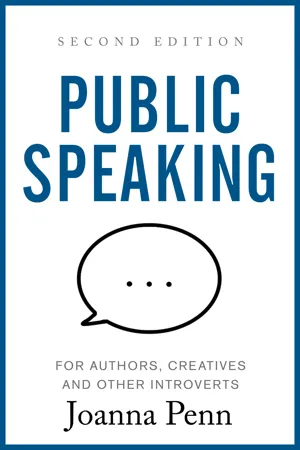
- English
- ePUB (mobile friendly)
- Available on iOS & Android
About this book
Are you an author or creative preparing for success? Do you want to learn to speak effectively in front of an audience?
All successful creatives have to speak and present in public, whether that's at a festival, on a podcast or radio show, or as part of earning multiple streams of income.
But you don't have to be like Tony Robbins, bouncing around on stage with a booming voice and larger than life personality.
You just have to be you and tell your story in your own way.
In this book, I'll share everything I know as a professional speaker, author and introvert. It includes the practicalities of speaking, as well as mindset issues like anxiety, plus the business side if you want to make speaking an income stream. You will discover:
PART 1: Practicalities of Speaking
Types of speaking, deciding on your topic, preparation, managing your energy, tips for slide packs, handouts, workbooks and more, personal presentation, giving the talk, managing people, panels, feedback and testimonials, performance tips, improving your speaking over time
PART 2: Mindset
Tackling anxiety, growing your confidence and authenticity
PART 3: The Speaking Business
How to get speaking events, running your own events, marketing, generosity and networking with others, your speaker brand, website and speaker's page, professional photos, email marketing, content marketing, social media, video, audio, how much to charge, increasing your revenue streams, financial considerations.
If you want to learn how to speak effectively in front of an audience, sample or buy now.
Frequently asked questions
- Essential is ideal for learners and professionals who enjoy exploring a wide range of subjects. Access the Essential Library with 800,000+ trusted titles and best-sellers across business, personal growth, and the humanities. Includes unlimited reading time and Standard Read Aloud voice.
- Complete: Perfect for advanced learners and researchers needing full, unrestricted access. Unlock 1.4M+ books across hundreds of subjects, including academic and specialized titles. The Complete Plan also includes advanced features like Premium Read Aloud and Research Assistant.
Please note we cannot support devices running on iOS 13 and Android 7 or earlier. Learn more about using the app.
Information
Part III
Practicalities of the speaking business
3.1 How to get speaking work
(1) Make it clear that you’re a speaker
(2) Attract attention online
“I made the decision to blog properly and to really start blogging a lot and to spread my word through the blog ecosystem and all the aspects of online marketing. That made the biggest difference of all, I think, for both my fees and my number of talks.”
(3) Volunteer for free speaking events
(4) Go to networking events
(5) Pitch for speaking events
(6) Speaking bureaux
3.2 Running your own public events
Ticketing
Venue
- Is it close to transport hubs and/or parking?
- Is it close to amenities for food or coffee for breaks and lunch? (or you need to ensure that there’s adequate catering included)
- Does the room have enough space for your audience without being cramped?
- Is there a break-out space for eating, coffee or breaks and somewhere for smokers or vaping?
- Does it have natural light and adequate airflow, especially for full-day events? You’ll also need the capacity for shade or blackout if you’re using slides or showing videos.
- Does it have proper temperature control, heating, or aircon, depending on your location?
- Does it have the required technology, for example, screen and projector? Do you need a tech person to help set up?
- Does it have appropriate accessibility for those who need it?
Table of contents
- Cover
- Title Page
- Contents
- Introduction
- Why speak anyway?
- What is an introvert?
- I. Practicalities of speaking
- II. Mindset
- III. Practicalities of the speaking business
- Conclusion and next steps
- Thank you. Need more help?
- IV. Appendices
- Acknowledgments
- About Joanna Penn
- More Books And Courses From Joanna Penn
- Copyright